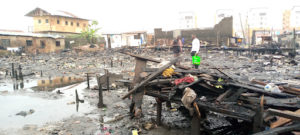Makoko: How Fire Outbreak Rendered Lagos Residents Homeless
A fire outbreak gutted over 50 houses in Makoko, Lagos State's largest slum, leaving affected residents homeless.

After a very long and busy day, Moses (last name withheld), a resident of Makoko Community, Lagos, Southwest Nigeria, had just settled in with his friends when he heard a loud call for help in the neighbouring building.
Before he could make his way to the scene of fire, the inferno had extended to other houses surrounding it. “We began to fetch and pour water to control it but it was not enough to quench it,” Moses told Humangle.
According to a report, the fire outbreak had razed down no fewer than fifty houses and shops in Church lane opposite Church street in Makoko. The incident, which happened in the evening of Aug. 30 has rendered several residents of the community homeless.

How it started … the conflicting story
“We had just finished from a church program when they brought the light around 4 p.m. but the current was too high,” Bolaji John (not real name) narrated.
“Unfortunately, the man who lives in the building the fire started from, did not switch off all his appliances before leaving the house. The electricity voltage was too high, then it sparked and started the fire. No one noticed it until it began to spread,” he said.
“I was the one who jumped into the building first, to see if we could locate the source but the fire was uncontrollable. It caught other houses because they were close,” Moses added.
However, some residents claimed that the outbreak was orchestrated by land owners. HumAngle learnt that the area was leased out to residents but they recently had a confrontation with the owners who said they should vacate the premises and no one did.
“Although, the fire started when the light came but some people who are affected believe that the Omo-Onlile [land owners] sent someone to start the fire and the issue is still ongoing in the station,” Moses told HumAngle.

When asked if any form of reconstruction were in place to rebuild the burnt houses, this reporter was told that the land owners had denied residents the right to rebuild.
“The land owners came the day after the incident and immediately asked everyone to leave the premises, saying they want to use their land. That is why some people believe that the fire was orchestrated,” John explained.
However, the Chairman, Yaba Local Council Development, Kayode Omiyale, who visited the scene assured the victims that the government has no aim to take possession of the area.
The blame game
Moses said that when the fire had escalated beyond control, “we tried putting a call through to the PHCN officials to turn off the light but they did not respond in time. It is not right and we all live in this country together.”
“We could not get through to any emergency unit on time. The emergency unit came very late, after almost all houses had been consumed. The PHCN team also came later and started disconnecting the wires from houses.”
When this reporter visited the scene, he found out that most houses consumed by the inferno were constructed with wood. The houses were erected well enough to allow water to pass underneath.
Findings showed that the fire started from a block-constructed house. It, however, extended because the wooden houses were closer to it, since they shared the same electrical line.
“There are no roads and proper drainage within the houses. They are all connected to themselves, so it was easy for the fire to spread very quickly, even when trying to reduce it,” a resident, who spoke under anonymity, said.
While most affected residents have since relocated, some still return to check for remnants.
Makoko and its recurrent issues
Makoko is an informal settlement slum, located across the Lagos Third Mainland Bridge. The community, in 2012, was estimated to have a population of over 84,000 residents who migrated from different parts of the country, including Benin republic, to settle on the coast.
The slum is known to be the largest settlement for informal dwellers in Lagos State. In 2012, the Lagos State government ordered a demolition of some parts of the slum and nearly 3000 people lost their shops and homes.
In 2020, the state government made a move to relocate the slum due to the uncontrolled crises residents in the community suffer. However, several appeals have been made to stop this action.
Today the community still suffers from recurrent issues like flooding, killings, health challenges, and marginalisation. Humangle observed that the poor infrastructural development – drainages, road network, electrical connection – in the community might have also been a contributing factor for the fire outbreak.
Community awaits intervention
“Most people have left or sought for another option. We have not seen or heard anything since the day of the incident,” Bolaji said.
Omiyale had, during his visit, promised that a relief committee would be set up for affected residents.
When asked if the relief committee had met with residents, Bolaji replied that “some people whose houses were partially consumed have begun to patch it up with zinc and leather materials. But for others, no one has come to meet them in the last four days.”
Support Our Journalism
There are millions of ordinary people affected by conflict in Africa whose stories are missing in the mainstream media. HumAngle is determined to tell those challenging and under-reported stories, hoping that the people impacted by these conflicts will find the safety and security they deserve.
To ensure that we continue to provide public service coverage, we have a small favour to ask you. We want you to be part of our journalistic endeavour by contributing a token to us.
Your donation will further promote a robust, free, and independent media.
Donate HereStay Closer To The Stories That Matter




